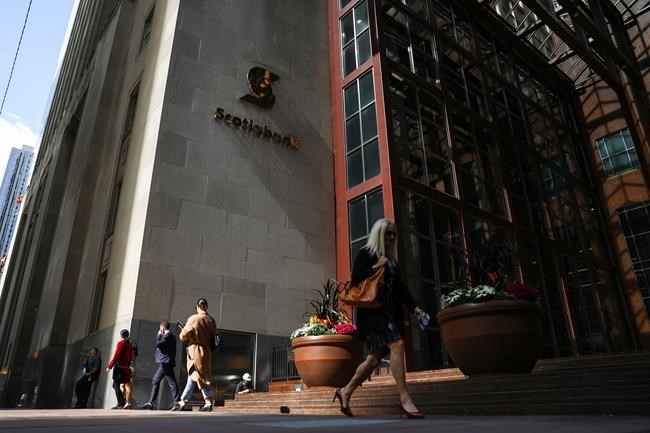TORONTO — North American stock markets gave back some of the previous day's gains after a slowing but still hot U.S. jobs report reinforced expectations that the Federal Reserve will proceed with aggressive interest rate hikes.
Hopes that the central bank would take a pause in raising rates were stoked Thursday by weaker ADP private payroll numbers. But Friday's non-farm employment numbers were stronger than expected with 390,000 jobs created in May and the April number increased.
"I think people are trying to talk themselves into a play, but the bottom line is that inflation is still high, the central banks have to be more aggressive," said Colin Cieszynski, chief market strategist at SIA Wealth Management.
He said every central bank member who spoke this week, including the dovish vice-chairwoman Lael Brainard, said interest rates have to keep rising. The Bank of Canada this week hiked rates by 50 basis points and said it's got to keep the foot on the pedal and maybe get more aggressive.
As a result, U.S. 10-year treasury bond yields increased closer to three per cent, Canadian 10-year government bonds moved to 3.07 per cent and the U.S. dollar was stronger.
Cieszynski said the jobs report seals the deal that there's going to be at least two 50-basis rate hikes in upcoming Fed meetings.
"I mean there's nothing in there to make the Fed rethink anything," he said in an interview.
While the U.S. central bank has said it doesn't foresee going above half a per cent at a time, it could end up doing a longer series of 50-basis-point increases that drags the increases for longer.
Investors worry that rising interest rates will not only slow the economy but could push the economy into recession.
The S&P/TSX composite index closed down 241.08 points to 20,790.73, ending a volatile week a bit higher.
In New York, the Dow Jones industrial average was down 348.58 points at 32,899.70. The S&P 500 index was down 68.28 points at 4,108.54, while the Nasdaq composite was down 304.17 points or 2.5 per cent at 12,012.73.
The weakness pushed U.S. markets a little lower for the week.
Technology was the weakest sector on the TSX, losing 3.7 per cent with Shopify Inc. dropping 11.2 per cent.
It fell because of higher bond yields and the fact that it's just a "higher beta sector," said Cieszynski.
"When people are confident and enthusiastic, tech is one of the places they go to and when they're really retrenching, tech is one of the first places they leave."
Nine sectors lost ground, with health care down 3.4 per cent as Canopy Growth Corp. fell 8.5 per cent. BRP Inc. plunged 10.4 per cent after reporting a big drop in quarterly profits to push consumer discretionary lower.
Weaker bullion prices hurt the materials sector with Ero Copper Corp. down 5.4 per cent.
The August gold contract was down US$21.20 at US$1,850.20 an ounce and the July copper contract was down 8.1 cents at US$4.47 a pound.
Consumer staples ended the day up and energy inched higher as crude oil prices climbed to the highest level in nearly two months.
The July crude oil contract was up US$2.00 at US$118.87 per barrel after approaching US$120 earlier in the day. The July natural gas contract was up 3.8 cents at US$8.52 per mmBTU.
Shares of Baytex Energy Corp. increased 7.1 per cent while Tamarack Valley Energy Ltd. was up 5.1 per cent.
On Thursday, OPEC and its allies including Russia agreed to increase its output in July and August. That should weaken crude prices "unless some people are thinking that that's not going to be enough," said Cieszynski.
The increase in crude prices could soon propel gasoline prices to record highs.
The Canadian dollar traded for 79.50 cents US compared with 79.38 cents US on Thursday.
The week was choppy and there's not much economic data next week to shake up markets, he said.
"The earnings season is over, the big week for economics news is over. And now we're going to have a few days of investors just kind of having to sit back and chew on all of this."
Canadian employment numbers for May will be released next Friday.
Cieszynski thinks the numbers could be reasonably good as the economy is still reopening and energy prices are quite strong.
"So it sounds to me like things are starting to rebound a little bit, so we might do OK between the high energy prices, the high other commodity prices and just the economy reopening and people getting back to work."
This report by The Canadian Press was first published June 3, 2022.
Companies in this story: (TSX:SHOP, TSX:BTE, TSX:TVE, TSX:ERO, TSX:DOO, TSX:WEED, TSX:GSPTSE, TSX:CADUSD=X).
Ross Marowits, The Canadian Press


